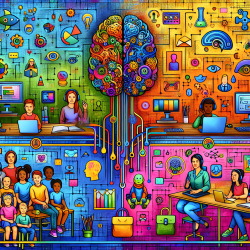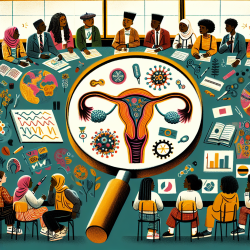In the realm of special education and online therapy, practitioners often encounter diverse challenges and opportunities to enhance their skills. The research paper "Disabled at Work: Body-Centric Cycles of Meaning-Making" by Zeyen and Branzei provides valuable insights into how disabled workers engage in meaning-making at work through body-centric processes. This blog post delves into the key outcomes of the research and offers practical recommendations for practitioners aiming to improve their skills and foster a more inclusive environment.
Understanding Body-Centric Meaning-Making
The research highlights that disabled workers often experience "body dramas" of suffering and thriving, which influence their cycles of meaning-making at work. These body dramas involve micro-interactions with colleagues and the broader organizational environment, shaping how disabled workers perceive their roles and contributions.
Dramas of Suffering
Disabled workers frequently face micro-aggressions and inappropriate accommodations, leading to body breakdowns. These experiences can erode their sense of self-worth and exacerbate their bodily vulnerabilities. For practitioners, it is crucial to recognize these signs of suffering and provide appropriate support to mitigate the negative impact on disabled workers.
Dramas of Thriving
Conversely, positive interactions and micro-affirmations can lead to body breakthroughs, where disabled workers feel valued and empowered. Practitioners should strive to create an environment that fosters such positive experiences, enabling disabled workers to leverage their unique strengths and contributions.
Implementing Research Outcomes in Practice
The research offers several actionable insights for practitioners looking to enhance their skills and support disabled workers effectively:
- Recognize and Address Micro-Aggressions: Practitioners should be vigilant in identifying micro-aggressions and take proactive steps to address them. This includes advocating for appropriate accommodations and creating a supportive work environment.
- Foster Positive Interactions: Encourage micro-affirmations by acknowledging the unique contributions of disabled workers. Positive reinforcement can significantly impact their sense of belonging and self-worth.
- Promote Inclusive Practices: Develop and implement inclusive practices that accommodate the diverse needs of disabled workers. This includes flexible work arrangements, accessible tools, and ongoing support.
- Encourage Self-Advocacy: Empower disabled workers to advocate for their needs and rights. Providing resources and training on self-advocacy can help them navigate challenges and assert their value in the workplace.
- Continuous Learning and Development: Practitioners should engage in continuous learning to stay informed about the latest research and best practices in supporting disabled workers. This includes participating in workshops, webinars, and professional development courses.
Encouraging Further Research
While the research by Zeyen and Branzei offers valuable insights, there is always room for further exploration. Practitioners are encouraged to conduct their own research and share their findings with the broader community. Collaborative efforts can lead to more comprehensive understanding and better support for disabled workers.
Conclusion
By implementing the outcomes of the research on body-centric cycles of meaning-making, practitioners can enhance their skills and create a more inclusive and supportive environment for disabled workers. Recognizing the importance of both suffering and thriving experiences, and taking proactive steps to address them, will lead to a more meaningful and fulfilling work experience for all.To read the original research paper, please follow this link:
Disabled at Work: Body-Centric Cycles of Meaning-Making.










